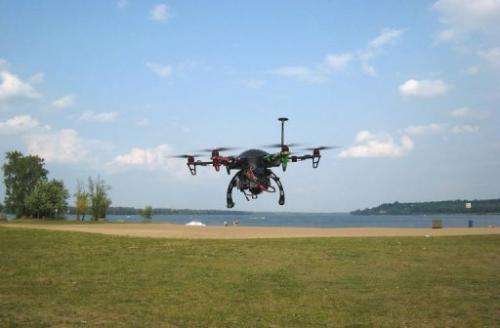Canada uses drones to drive away geese

Canada's capital has ordered drone strikes to rid a popular Ottawa beach of pesky geese that dirty the waters with fecal matter, demonstrating on Wednesday how it works.
The hexacopter—a 26-inch-wide remote-controlled hobby aircraft that was adapted by its owner for pest control—takes off every morning at dawn and chases away the waterfowl sullying the Ottawa River near Petrie Island park on the city's east side.
"It's been really effective," city councillor Bob Monette told AFP.
He said the city has tried using trained dogs, noise blasts, animal decoys and countless other means to try to shoo the geese away, but nothing worked. City staff a few years ago even tried spraying a foul-smelling chemical but the geese eventually got used to the smell.
Though majestic and beautiful birds, Canada geese drop a lot of dung that raises e-coli levels in the river, creating a health hazard for bathers. Last year, the Petrie Island beach had to be closed for 13 days.
Since deploying the drones in July, the number of geese in the area has dropped from hundreds to a few dozen, and the beach has been not been shut once, Monette said.
The owner and operator of the hexacopter, Steve Wambolt, said his novel business started by chance.

The former IT worker was pitching ariel photography services to Monette when the city councillor pressed him about other possible uses for the drone.
"I didn't know anything about geese before, and now ... I'm an expert," Wambolt said.
For example, he said, geese don't like black, silver or bright orange colors—similar to predators or hunters' vests.
So to be sure in tests that the geese were fleeing the hexacopter and not its operator, he discarded the orange safety vest.
What Wambolt learned—mostly by researching online—he incorporated into the redesign of his hexicopter, which took about two weeks. Its cameras were removed and speakers were added to play the sounds of predators as it flies low accross the beach.
The city even obtained a special "scare permit" from wildlife authorities to bother the protected birds.
And then the program took off.
As Wambolt demonstrated how the contraption works, curious beach-goers flocked to him to ask questions.
Unfortunately, the drone has not been effective at scaring away seagulls, one observer lamented.
"Seagulls are more stubborn," Wambolt said.
The $30,000-a-year program is to continue through to the end of October. And Monette said the city is planning to have Wambolt return again next year.
© 2013 AFP



















